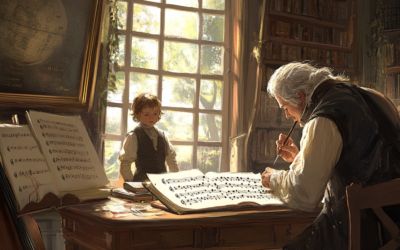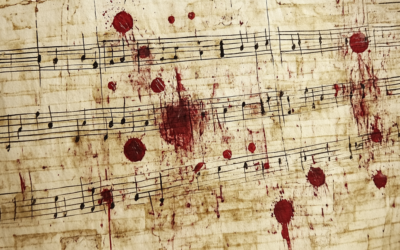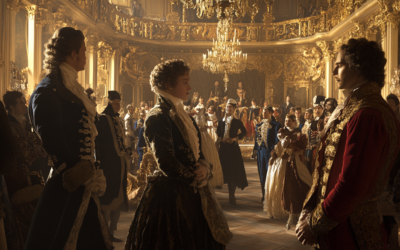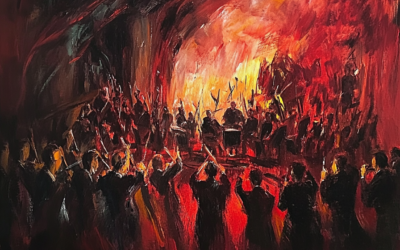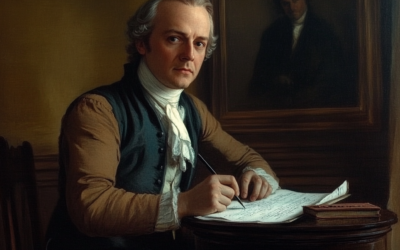Mozart's Letters:
A Legacy of Disappearances, Edits, and Forgeries
Unveiling the Irregularities and Manipulations in Mozart’s Correspondence.
The recently translated letters of Mozart reveal a puzzling pattern of missing originals, dubious authorship, and outright forgeries, casting doubt on the integrity of key documents. This tangled web—particularly within Mozart’s final years—demands a critical look to understand not only the man but also the influence of those who controlled his legacy.
Mozart: The Fall of the Gods
This book compiles the results of our studies on 18th-century music and Mozart, who has been revered for over two centuries as a deity. We dismantle the baseless cult of Mozart and strip away the clichés that falsely present him as a natural genius, revealing the contradictions in conventional biographies. In this work, divided into two parts, we identify and critically analyze several contradictory points in the vast Mozart bibliography. Each of the nearly 2,000 citations is meticulously sourced, allowing readers to verify the findings. This critical biography of Mozart emerges from these premises, addressing the numerous doubts raised by researchers.
"Mozart’s legacy, as seen through these letters, is less a window to the man himself and more a tapestry woven by those around him, where motives, omissions, and secrets were the fabric of his story."
Mozart: The Fall of the Gods
Mozart’s surviving letters, or what remains of them, are filled with glaring inconsistencies. Examining these letters reveals a peculiar narrative: missing originals, questionable entries, and edits that cast doubt on their authenticity and purpose. For example, in 1788, we find only five letters from Mozart, one of which survives only as a copy, while the others simply request funds. In 1791, this increases to 27 letters, yet 13 are not autograph, and 11 bear the “modifications” of his widow Constanze or her second husband, Nissen. The pattern in previous years shows a similarly scattered story.
Leopold’s Letters and a Sparse Record from Wolfgang
The body of correspondence between Mozart and his father, Leopold, could more accurately be called Leopold’s Letters. Up until 1777, roughly 350 letters are from Leopold, compared to only about 25 from Wolfgang. Between 1778 and 1779, Leopold’s 45 letters still exceed Wolfgang’s 30. Only from 1780 to 1783 does Wolfgang’s correspondence increase—about 130 letters, nearly all addressed to his father. After 1784, however, Wolfgang’s letters become sparse: 15 in 1784, then dropping to only two in 1785. While some letters may have been misplaced, others seem to be lost forever—censored, possibly, by later family members like his sister Nannerl and later his wife Constanze, to polish Wolfgang’s image and obscure certain relationships, notably with his former love, Aloysia Weber.
A Reluctant Writer and His Coded Messages
Mozart was hardly a keen letter-writer, tending toward a laziness that made even essential communication difficult. When he did write, he often veiled himself, rarely revealing his true thoughts. In requests for funds, particularly to his friend Johann Michael Puchberg, he seldom conveyed the full story. Sensitive matters, often coded or disguised in playful language, hint at hidden meanings. Some messages were even erased, partially torn, or entirely destroyed. Copying and “enhancing” letters, then discarding originals, was a common tactic used to shape Mozart’s image, whether for financial support, reputation management, or political gain.
The “Letter” to Lorenzo Da Ponte
One particularly disputed letter, supposedly sent to librettist Lorenzo Da Ponte in September 1791, exemplifies these doubts. The sole surviving copy, located in Berlin’s Prussian Library, lacks a signature or named addressee. Additionally, it describes Mozart in a state of extreme depression—at odds with his generally positive disposition despite health challenges. This discrepancy prompted editor Schiedermair to reject the letter as inauthentic.
Titles, Fables, and Imagined Performances
Even where letters are verified as authentic, caution is required. Mozart’s letters occasionally contain exaggerations and untruths: he claimed titles he did not hold, overstated his examination success in Bologna, fabricated concert appearances to justify loan requests, and even invented tales of rivalries. This surviving correspondence—missing, altered, and sometimes fabricated—reveals a portrait of Mozart shaped as much by omission as by his own hand.
You May Also Like
Leopold Mozart: A Portrait in Shadows
Leopold Mozart’s life was a whirlwind of ambition, deceit, and disappointment—a stark portrait of a man chasing success at any cost.
The London Pieces: Mozart or Make-Believe?
The London pieces, edited for modern tastes, lose their authenticity. Only the uncorrected originals show Mozart’s true early voice—naïve yet authentic.
The Myth of the “Viennese Classics”: Mozart’s True Heritage and the Empire’s Agenda
Mozart wasn’t the quintessential Viennese; rather, he was shaped by German heritage and an opportunistic empire that controlled music as fiercely as it did its people.
The Nationalistic Roots of the Philharmonic Legacy
Under Goebbels, the Berliner Philharmoniker became an instrument of Nazi propaganda, framing German composers as the supreme guardians of musical heritage.
Australian Scholars Confirm Our Findings on Mozart’s Forged Catalogue
Professor Martin Jarvis of Darwin University confirmed our long-held findings that Mozart’s personal catalogue is a forgery, during his recent lecture The Mozart Scam. Forensic analysis continues to unravel the myths surrounding Mozart’s legacy.
The Italian Journey
The Mozarts’ Italian journey of 1769 was not a leisurely Grand Tour but a strategic mission driven by ambition, navigating the treacherous roads of 18th-century Europe in pursuit of fame and fortune.


